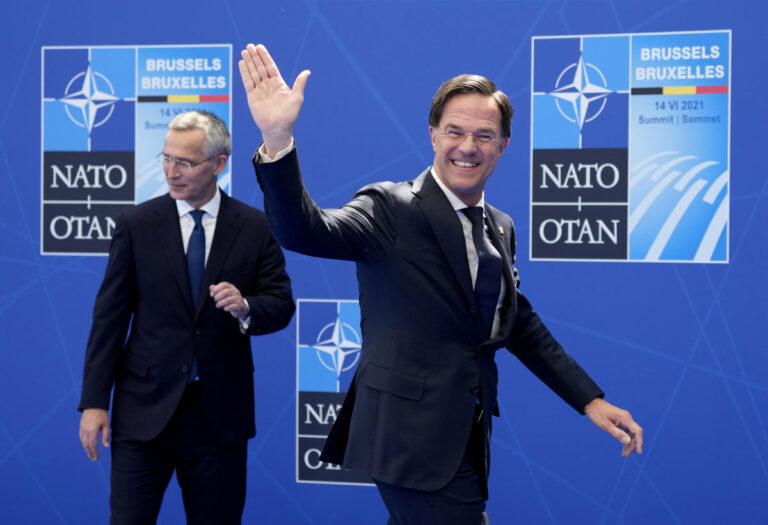THE HAGUE, Netherlands (AP) — After more than a decade at the helm of Dutch politics, Prime Minister Mark Rutte knows a thing or two about finding agreement among rival coalition partners. Now, as NATO’s new secretary general, Rutte is poised to bring his experience leading four Dutch multi-party governments to the international stage.
On Thursday, Romania’s president withdrew from the race for the league’s top post, leaving Rutte as the only remaining candidate and almost certain to take over as head of the world’s largest military organisation from October.
Rutte’s appointment could be confirmed at a meeting of NATO ambassadors in the coming days or when President Joe Biden and NATO ambassadors meet in Washington from July 9-11.
The secretary general presides over the meetings and guides the sometimes delicate discussions between NATO’s 32 member states to ensure that the consensus-based organization continues to function, and NATO’s leaders ensure that decisions are implemented and speak on behalf of all member states.
Before taking over Jens StoltenbergPrime Minister Rutte is facing a test.
It took all of Rutte’s diplomatic skills to secure the NATO secretary-general position, including persuading skeptics such as Hungarian Prime Minister Viktor Orban and Turkish President Recep Tayyip Erdogan to support his candidacy.
“Like Stoltenberg, Rutte is a practical man and one of the few European politicians who has built a good working relationship not only with Joe Biden but also with Donald Trump. This could be an important asset for NATO after the US presidential election in November,” said Oana Lungescu, a former NATO spokesman.
Rutte “is seen as someone who can be trusted to lead NATO in turbulent times, just as Stoltenberg has done for the past decade,” Rungesku, now a research fellow at the Royal Institute for Security Studies, a defence and security think tank, told The Associated Press.
From historian to businessman and politician
Rutte, who has a degree in history and was human resources director at Unilever, the multinational consumer goods maker, first became Dutch prime minister in October 2010. He resigned last July as the four-party coalition government fought over how to curb immigration.
Prime Minister Rutte has been one of Europe’s top politicians for many years, but he has always been a man with his feet on the ground.
He can often be seen cycling around his hometown of The Hague, or walking from his office to a meeting, snacking on an apple, and last year he drove to the ornate Royal Palace in a Saab station wagon to hand in his resignation from government to King Willem-Alexander.
As Dutch prime minister, Rutte was a strong supporter of Ukraine and its right to defend itself after Russia’s invasion in 2022. Under his leadership, the Netherlands pledged to provide Kyiv with military equipment, including Leopard tanks and F-16 fighter jets.
Rutte’s political career hasn’t been smooth sailing.
Rutte has bounced back from a number of scandals during his time as Dutch prime minister, and was nicknamed “Teflon Mark” for his skill at avoiding political blemishes.
Earlier in 2021, his third coalition government resigned over a scandal in which thousands of parents were wrongly labelled as fraudsters in an investigation into child welfare benefits.
A few months later, Rutte proved a master of survival by leading his conservative People’s Party for Freedom and Democracy to victory in the general election and forming his fourth and final coalition government from the same parties that had resigned to encourage voting.
Experience in the international political arena
During his time in office, Rutte has also honed his skills at the international level, lighting up European Union summits with big smiles and firm handshakes, building strong working relationships with leading leaders including former German Chancellor Angela Merkel and France’s Emmanuel Macron, and visiting with both Biden and Trump in Washington.
“As a veteran of EU summits, Rutte will have a different understanding of the complex NATO-EU relationship than Stoltenberg,” Lungesk said, “but he will also need to ensure that EU defence efforts complement, rather than undermine, NATO at this critical time.”
Rutte’s country has long missed the NATO target of spending 2 percent of GDP on defense but is expected to slightly exceed that target this year. NATO estimates the Netherlands will spend 2.05 percent of GDP on defense, up from about 1.2 percent a decade ago, when NATO pledged to increase the military budget after Russia annexed Crimea.
___
Associated Press writer Lorne Cook in Brussels contributed to this report.
___
Read more NATO news from The Associated Press: https://apnews.com/hub/nato

